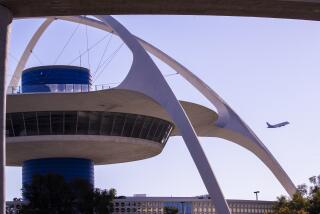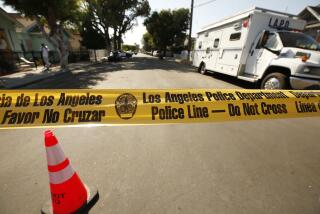Police Refused to Search Jetliner Unless It Was Moved : Tiff Over LAX Bomb Threat Leads to Policy Review
- Share via
An incident in which the police bomb squad refused to search a United Airlines jetliner at Los Angeles International Airport has prompted a review by police and airport officials of procedures used at LAX during airline bomb threats.
Police officers, representatives from the Federal Aviation Administration, the Department of Airports and others have been meeting privately this month to discuss the March 4 incident, in which bomb squad members refused to go through a United DC-10 unless it was towed to a more remote site.
When United officials opted not to move it, airline employees had to search the plane, which had been parked in a hangar area after being towed from the airline’s passenger terminal. They found no bombs.
The commander of the Police Department’s bomb squad, Lt. Jimmie J. Finn, downplayed the incident, saying this week: “No one (from the squad) is refusing to go to the airport, but there are some differing opinions as to what are the most suitable, safest locations for bomb searches.”
Finn would not discuss the March 4 incident or the meetings that have followed, explaining: “This kind of thing deals with life and death, and I don’t think it has any business being put out on the table for the public.”
Aviation officials were also hesitant to comment. However, privately some said the same controversy--namely, where jetliners should be searched at LAX after bomb threats--has cropped up before between police and the airlines.
As a result, officials estimated, there have been half a dozen or more searches in recent months conducted by airline employees who had no expertise in detecting planted explosive devices--a potentially dangerous undertaking if a bomb were found and equally dangerous if one went undetected.
“The idea is to get the bomb search done as quick as possible and as extensively as possible by the most qualified people,” said Russell Park, an FAA spokesman. “We just want everybody to shake hands again. . . .”
Under federal regulations, air carriers are responsible for inspecting their own airplanes after bomb threats. But at LAX, the Police Department has voluntarily undertaken that responsibility and conducts virtually all aircraft searches for explosive devices, said Jay Adsen, regional manager of the FAA’s civil aviation security division.
The FAA provides funding so the Air Force can train Los Angeles police bomb squad members and their search dogs to find explosive devices, Adsen said.
According to Park, the March 4 tiff between the bomb squad and United Airlines personnel developed after squad members apparently “misunderstood” agreed-upon search procedures at the airport.
Those procedures dictate that if at all possible, aircraft at LAX should taxi or be towed to one of two remote sites at the airport’s west end where they are then searched, authorities explained.
However, if airline officials believe it more practical to have their planes searched at other locations, it is the airline that has the final say, Park said.
United spokesman Matt Gonring said that in this case, when United’s Flight 284 received an anonymous telephone threat as it prepared to depart for Denver, the plane’s passengers were removed. The DC-10 was then towed to an undisclosed hanger area.
But when Los Angeles police explosives experts arrived, Gonring said, they refused to go through the plane unless it was moved--ostensibly to one of the two remote sites.
“I don’t want to get into the details of the threat we received, but it did not give us enough (reason) to believe that it was (a legitimate threat),” Gonring said.
“We took into consideration the length of time it would have taken to tow it to another place. We felt comfortable with conducting our own search at that location” after the police bomb squad decided to back off, he said.
Finn, the bomb squad’s commander, would not explain why members of his unit wanted the jetliner moved to a more remote site.
Gonring, meanwhile, said United officials remain “concerned” by the bomb squad’s actions, but added that the airline considers what happened on March 4 an “airport-city disagreement.”
“We just hope it’s resolved soon,” he said.
More to Read
Sign up for Essential California
The most important California stories and recommendations in your inbox every morning.
You may occasionally receive promotional content from the Los Angeles Times.













